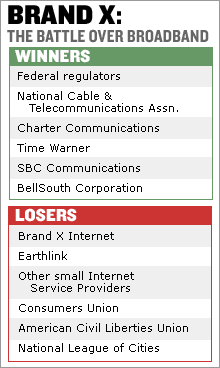 |
| Read the court's decision
|
|
|
|
|
|
|
|
|
NEW YORK (CNN/Money) -
The U.S. Supreme Court on Monday overturned a prior ruling that required cable operators to open up their high-speed Internet lines to rivals.
At issue in the case, FCC v. Brand X, was whether cable operators should be required under federal law to lease their cable lines to competitors, much the way local phone companies were forced years ago to open up their lines to long-distance phone companies.
The justices overturned the U.S. appeals court ruling by a 6-3 vote.
In a separate case Monday, the court ruled that software companies can be held liable for copyright infringement when individuals use their technology to download songs and movies illegally.
The unanimous decision handed the music and movie industries a crucial victory in their battle to curb Internet piracy but it was a big blow to technology companies. (For more on that case, click here).
In appealing to the Supreme Court in the Brand X case, the government and cable companies argued the U.S. appeals court had not extended the required deference to the FCC's expertise and decision-making process.
Justice Clarence Thomas agreed in the majority opinion that the appeals court had erred.
Justices Antonin Scalia, David Souter and Ruth Bader Ginsburg dissented.
The decision is a big victory for the Federal Communications Commission and major telecommunications companies, including Charter Communications (Research), Time Warner (Research) and SBC Communications (Research).
On the losing side are small Internet service providers, including Earthlink (Research), consumer rights groups, and a host of local governments.
The case, which turned on the technical classification of cable modem services under federal communications law, has been described as crucial to the future of competition in the market of high-speed, or broadband, Internet service -- including how fast broadband service becomes available, what features it has, and what it costs consumers.
For all of today's top stories, click here.

|